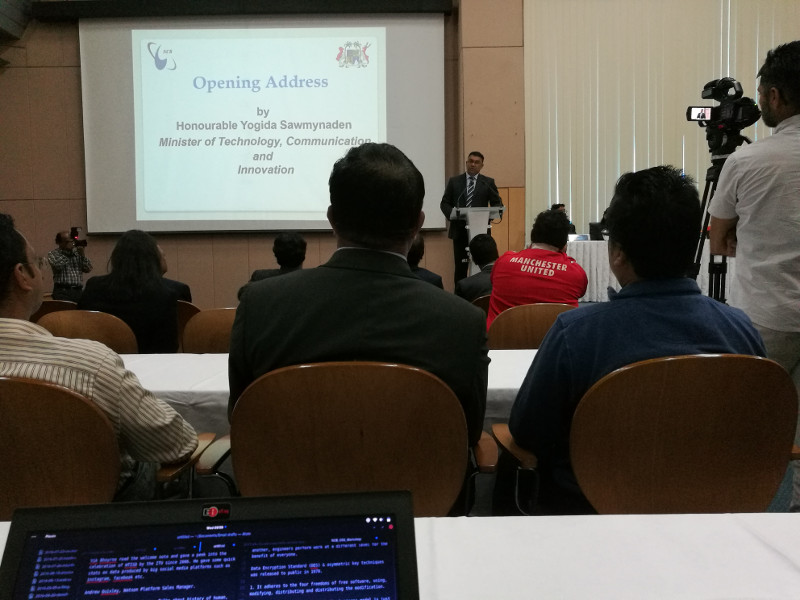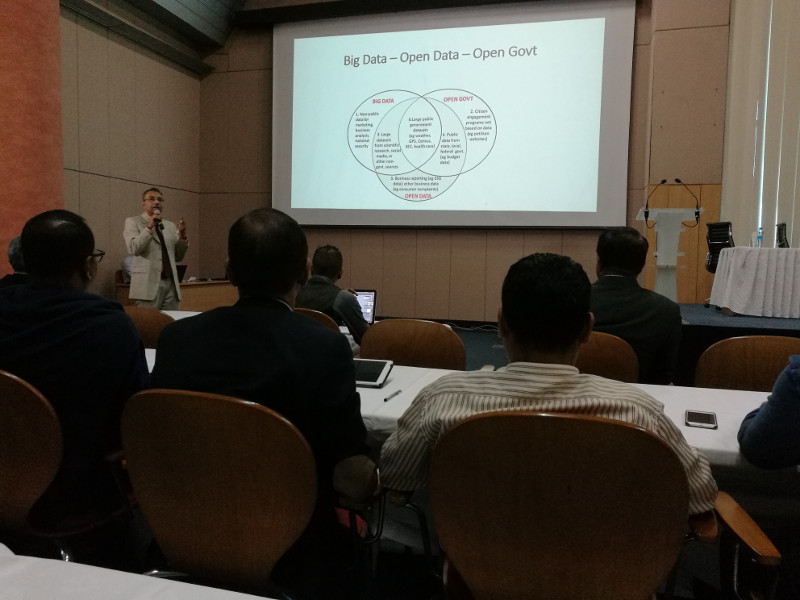I attended a workshop titled “Big Data for Big Impact” by the National Computer Board today at the Cyber Tower I in Ebène, commemorating the World Telecommunication and Information Society Day (WTISD).
The WTISD has been celebrated annually since 17 May since 1969, marking the founding of ITU1 and the signing of the first International Telegraph Convention in 1865.
The National Computer Board has been organizing events to commemorate the WTISD since 2007. Source: www.ncb.mu
Vik Bhoyroo, Acting Executive Director of the National Computer Board, read the welcome note. He briefed the audience about the history of WTISD and this year’s theme, i.e Big Data for Big Impact. He gave some quick stats on data produced by major social media platforms such as Instagram, Facebook, Twitter etc.
The next speaker was Andrew Quixley, Watson Platform Sales Lead. His first slide showed a 12K years old clay painting. He talked about the history of humans and evolution of language. He stressed on the importance of communication for human beings. He mentioned the invention of printing press and how things changed since then in terms of producing data while communicating.
Every day, we create 2.5 quintillion bytes of data — so much that 90% of the data in the world today has been created in the last two years alone. Source: ibm.com
Andrew concluded his presentation with a comment about technology enablers that will continue to grow, e.g computer processing speed, storage etc, double every couple of years. He invited the audience to attend his second session in the afternoon where he could answer questions.
The Minister of Technology, Communication and Innovation, (Hon) Yogida Sawmynaden was then invited to address a few words as the guest of honour.

The minister read his script on the advantages of Big Data and commented on the amount of data that the government produces. He mentioned about addressing citizen’s problems through the Citizen Support Portal. He invited people to use the platform.
There was tea break after the minister’s speech.
Ajmal Dookhan, Software Engineer, Business Objectifs Ltd, did a presentation on Big Data in the Mauritian context.
Ajmal Dookhan, "it took me one hour to drive from Curepipe to Ebène". 🚗#NCBWorkshop #Mauritius #WTISD #BugData #Analytics #fb pic.twitter.com/5VVPRkvEfD
— Ish Sookun (@IshSookun) May 17, 2017
The Chief Technical Officer of the Ministry of TCI, Rajnish Hawabhay, did a presentation on Open Data.

Though the Q & A session was reserved for the afternoon, S. Moonesamy was able to get answers to his questions outside the question time. Technically he didn’t get answers he wished for but R. Hawabhay had a tough time explaining his position in relation to the Open Data Policy which hasn’t been made public yet. S. Moonesamy complained on the lack of communication from the Ministry of TCI and excluding him from workshops on Open Data that are scheduled for next week.
CTO of Ministry of TCI talking about #OpenData in Mauritius and apps. Is the data already available? Seriously. #fb
— Nirvan Pagooah (@nirvanpagooah) May 17, 2017
I went to meet S. Moonesamy outside the conference room and we continued chatting about the Open Data Policy in a less heated manner.
A few minutes before lunch time the Question & Answer session started. I commented on the delay in getting replies from the Ministry of Technology, Communication and Innovation, and how my request for information about the MNIS affidavits have circled round without producing result. I also commented that on the Citizen Support Portal there is no department for MNIS, either under PMO or MTCI sections. I then questioned him on the usefulness of the portal in getting timely answers in the absence of a Freedom of Information Act. Rajnish replied that the Citizen Support Portal acts as a distributor of citizens queries and tracks the progress. Each support request has a SLA period within which the request should be attended. There is no mention of the SLA in the user guide of the Citizen Support Portal. I would not have known of this SLA if Rajnish didn’t mention it today. If the SLA isn’t enforced through a legislation then the portal is no improvement in the citizen’s quest for information.
S. Moonesamy live streamed the session.
We then had a casual chat with Rajnish at lunch time where we joked about unproductive bureaucracy. To be honest, Rajnish is among the few government officers who addressed queries and made the best effort to provide an answer.
The post-lunch session was dedicated to the demo and practice on the IBM Bluemix platform. Andrew did another presentation after which he attended to questions.
Sun commented about latency and unavailability of an IBM datacenter near Mauritius (e.g Africa region). He asked Andrew about IBM’s plans for Africa. Andrew could not answer about future plans for the neighbouring countries.
I find it extremely disappointing the #cloud services such as AWS, Azure, IBM do not have a data center we can use in the #African region.
— Sun (@Sun) May 17, 2017
The practical session was hindered due to bad internet connection.
Demo stopped due to Internet issues. The presenter is now trying Firefox instead of Microsoft Edge. pic.twitter.com/EKm4AYbcIZ
— Sun (@Sun) May 17, 2017
As people started leaving the conference room one after another and the internet connection didn’t improve the presenters decided to end the session. The workshop ended before 16h00.